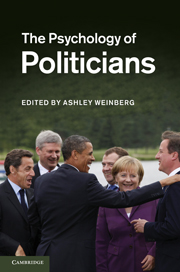Book contents
- Frontmatter
- Contents
- Figures
- Tables
- Acknowledgements
- Contributors
- 1 The psychology of politicians
- Part I Becoming politicians
- Part II Being at the centre of things
- 4 What makes a successful politician?
- 5 Cognitive skills and motivation to adapt to social change among Polish politicians
- 6 Political leadership and its development
- Part III Coping with pressure?
- Part IV People as politicians
- Index
- References
4 - What makes a successful politician?
The social skills of politics
Published online by Cambridge University Press: 05 December 2011
- Frontmatter
- Contents
- Figures
- Tables
- Acknowledgements
- Contributors
- 1 The psychology of politicians
- Part I Becoming politicians
- Part II Being at the centre of things
- 4 What makes a successful politician?
- 5 Cognitive skills and motivation to adapt to social change among Polish politicians
- 6 Political leadership and its development
- Part III Coping with pressure?
- Part IV People as politicians
- Index
- References
Summary
In ‘The experimental analysis of social performance’, Argyle and Kendon (1967) proposed that social behaviour can be understood as a form of skill. Social behaviour, they argued, involves processes comparable to those involved in motor skills, such as driving a car or playing a game of tennis. Given that we already know a great deal about motor skill processes, they proposed that this knowledge could be used to advance our understanding of social interaction. In recent years, the Social Skills Model has been significantly revised and updated (e.g. Hargie and Marshall, 1986; Hargie, 1997; Hargie 2006a, 2006b). Although neither version was intended to encompass political behaviour, in this chapter it will be argued that the model has significant implications for our understanding of what makes a successful politician.
Not only has the Social Skills Model contributed to our understanding of social interaction and interpersonal communication (Bull, 2002), it also has significant practical applications. If social interaction is a skill, then it should be possible for people to learn to interact more effectively, just as it is possible to improve performance on any other skill (Argyle and Kendon, 1967). This proposal was formalised in what was termed social skills training. More recently, it has more become more commonly known as communication skills training (CST), and has been used extensively in a wide variety of social contexts (e.g., Hargie, 2006c).
- Type
- Chapter
- Information
- The Psychology of Politicians , pp. 61 - 75Publisher: Cambridge University PressPrint publication year: 2011
References
- 4
- Cited by

